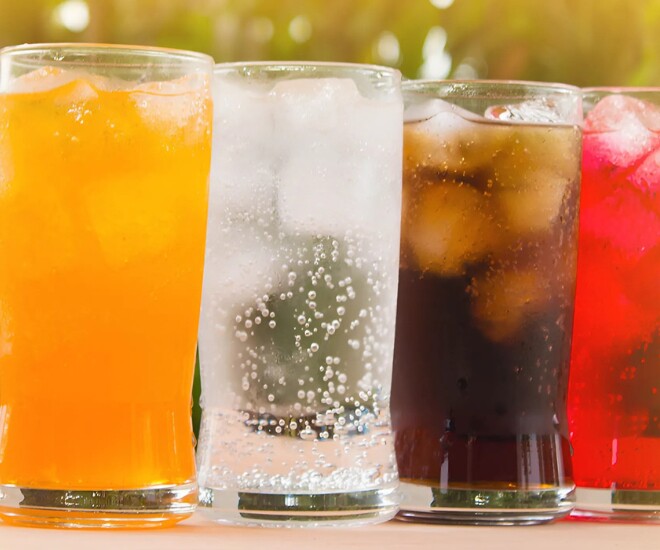Many people continue with their old dietary habits without considering the long-term consequences. In reality, proactively adjusting your daily menu is the first step towards maintaining your health in middle age. Here’s a list of seemingly familiar foods and beverages that are no longer suitable for people over 40.
1. Sugary Drinks
Sugary drinks, including carbonated soft drinks, packaged fruit juices, and milk teas, are the primary culprits of weight gain and potential cardiovascular risks. The high levels of fructose in these beverages provide empty calories and can lead to insulin resistance, resulting in fat accumulation in the liver and abdominal area.

Sugary drinks are a leading cause of weight gain and potential cardiovascular risks. (Illustration)
After the age of 40, the body’s ability to metabolize sugar decreases, causing sugary drinks to easily spike blood sugar levels, increase pressure on the cardiovascular system, and contribute to the development of type 2 diabetes. Instead, opt for water, fresh fruit juices without added sugar, or green tea to stay hydrated and healthy.
2. Processed Meats
Processed meats such as sausages, bacon, ham, and deli meats are convenient but loaded with salt, saturated fat, and chemical preservatives like nitrates. The high salt content in these products contributes to high blood pressure, a major risk factor for cardiovascular disease. Saturated fat and bad cholesterol (LDL) can clog arteries, leading to atherosclerosis and an increased risk of heart attack and stroke.
Furthermore, some studies indicate a link between the consumption of processed meats and the risk of cancer. To protect your cardiovascular health and maintain a healthy weight, minimize your intake of processed meats and opt for fresh, lean meats prepared at home.
3. Refined Carbohydrates
Refined carbohydrates found in white bread, white rice, pasta, and pastries provide quick energy but have a high glycemic index. This means they are rapidly converted into blood sugar, causing insulin spikes. After the age of 40, the body’s ability to regulate blood sugar may decrease, making the frequent consumption of refined carbohydrates more likely to lead to insulin resistance and an increased risk of type 2 diabetes.
Additionally, refined carbohydrates are typically low in fiber, causing you to feel hungry sooner and eat more, leading to weight gain. Instead, opt for whole grains such as brown rice, whole wheat bread, and oatmeal to provide fiber, stabilize blood sugar levels, and promote a feeling of fullness.

(Illustration)
4. Fried Foods
Fried foods like French fries, fried chicken, and fried fermented pork sausage are usually cooked in reused oil, creating trans fat and other harmful compounds. Trans fat is a particularly harmful type of fat for cardiovascular health, as it increases bad cholesterol (LDL) and decreases good cholesterol (HDL), leading to atherosclerosis and an increased risk of heart disease.
Additionally, regularly consuming fried foods provides a significant amount of empty calories, leading to fat accumulation and rapid weight gain. To protect your health, minimize fried foods and opt for healthier cooking methods such as steaming, boiling, grilling, or pan-frying with minimal oil.
5. Alcoholic Beverages
Alcoholic drinks contain a significant number of calories and can lead to weight gain, especially belly fat, when consumed in excess. Moreover, regular and heavy drinking puts pressure on the liver and increases triglyceride levels in the blood – a type of fat that is harmful to cardiovascular health.
For individuals over 40, the liver and kidneys may not function as efficiently as before, making it more challenging to detoxify the body from alcohol consumption, negatively impacting overall health. Excessive drinking can also increase blood pressure, weaken the heart, and raise the risk of stroke. Reducing or quitting alcohol consumption is an effective way to protect cardiovascular health and control weight as one enters middle age.

While a glass of wine may be good for the heart, excessive alcohol consumption has the opposite effect. (Illustration)
6. Packaged Snacks
Packaged snacks like chips, cookies, candies, and other similar items often contain high amounts of sugar, salt, unhealthy fats, and additives. They are designed to stimulate your taste buds, leading to excessive consumption without realizing the enormous amount of calories you’re taking in.
The high sugar and salt content in these products contribute to weight gain, high blood pressure, and an increased risk of cardiovascular disease. Unhealthy fats, particularly trans fats, can clog arteries. After the age of 40, the metabolism slows down, making it even more challenging to control your weight when regularly consuming packaged snacks. Opt for healthier alternatives such as nuts, fresh fruits, unsweetened yogurt, or sliced vegetables for your snacking needs.
7. Sugary Breakfast Cereals
Many breakfast cereals marketed as “healthy” actually contain a massive amount of sugar, almost equivalent to candy. This high sugar content provides empty calories and causes rapid blood sugar spikes after consumption, leading to sugar crashes and a quick return of hunger.
As a result, you’re more likely to overeat during the next meal, contributing to weight gain. Additionally, regular sugar intake increases the risk of type 2 diabetes and cardiovascular disease. When choosing breakfast cereals, read the labels carefully and opt for whole grain, unsweetened, low-fat, and high-fiber options for a healthy start to your day.
“The New Year’s ‘Triple-Decrease’ Detox: Revitalizing Your Body from the Inside Out”
The start of a new year is the perfect opportunity to reflect on your health and make positive changes. It’s time to ditch those unhealthy eating habits and embrace a healthier lifestyle. By making small, sustainable changes, you can protect your wellbeing, maintain a youthful appearance, and even slow down the aging process.
“3 Liver-Damaging Foods You May Be Eating Every Day”
Fatty liver disease is becoming a prevalent health issue in Vietnam, with an increasing number of young people also being affected. Experts emphasize that diet plays a crucial role in this condition. Alarmingly, many individuals remain unaware that three seemingly harmless types of food are the culprits behind the silent accumulation of fat in the liver.





































